-853X543.jpg)
Shishir Sharma: The Gentleman Actor!
by Aparajita Krishna April 21 2022, 12:00 am Estimated Reading Time: 22 mins, 40 secsAparajita Krishna goes on a long walk on the cobbled path of art, theatre and acting with actor Shishir Sharma, whose repertoire is vast.
To the contemporary viewers of Indian film-television-web-series content, actor Shishir Sharma, who carries in his height, carriage and speech an impressive personality and voice-tenor, would be a recognizable and admired actor. In the present-real-life-just concluded mega Shaadi season it would be of special interest to note that he had played Alia Bhatt’s father-in-law, on-screen, in Raazi. (My smile emojis).
For long he has been a very respected and practicing theatre-man. His group, Theatre Arpana, has been one of the most innovative and respected Indian groups that has performed at the prestigious Globe Theatre in London. Shishir’s lineage, home-ground, the cultural association of his parents with theatre and films, his own theatre experience in particular, read riveting, and very distinctive. The talk also flashbacks to an ideologically robust socio-political-cultural India that his parents were part of and to which he was born and brought up.
His introduction on Facebook reads that he is from Mumbai, went to Rishi Valley School, Narsee Monjee College and studied at the National School of Dubey (Satyadev Dubey). That for sure made an actor out of him.
I got talking to gentleman Shishir.
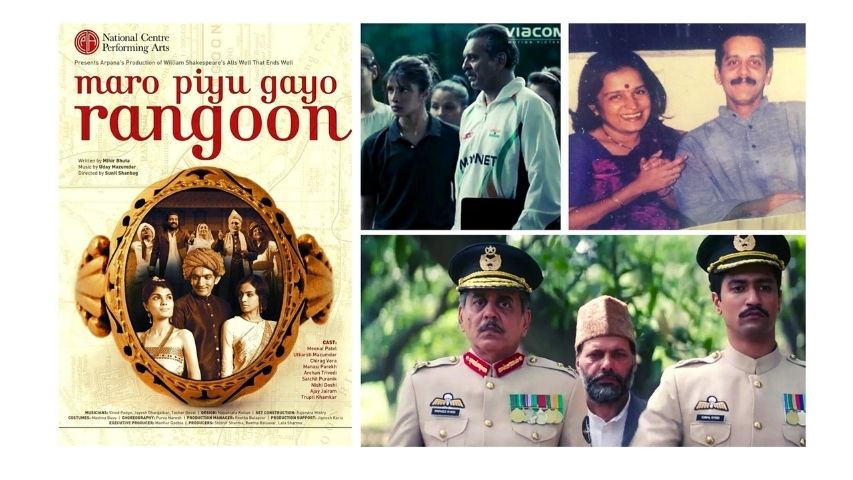
At 67, is age just a number or some kind of drawing of the balance sheet of life happens? Though your stage-screen presence is getting better and fitter with passing years.
I guess 67 is just a number. One has to go through life with those ups and downs and take things in your stride along the way. As an actor one needs to understand that there is a shelf-life to your being an actor and sometimes things really don’t go your way, but then you need to balance out things. Yes, I think as you grow older you do become wiser as they say. You have to be aware of the surroundings, which is what I did growing up. I was lucky to have got the roles and the characters to play.
Today you are a credible, established actor across platforms with a select run of good roles on the big screen too. You have a very noticeable stage and screen presence. How has the creative journey been?
Thank you for the compliments. The creative journey has been one of fulfillment with no regrets whatsoever. I have been very, very lucky to have gotten those characters to play, which have not only given me the recognition, but also the satisfaction of doing justice to the characters that have been offered to me right from my television days. Having started with a show on DD1 called Swabhimaan, which was produced by Plus Channel and directed by Mahesh Bhatt as the series director, I had the privilege and honour of working with very good directors as well as actors.
That journey was very satisfying, one which opened the doors to television in India with the advent of satellite channels. Working in television for almost 23 years was gruelling to say the least, but somehow I did get the time to do films that came my way. My first film was Satya. Not that I got great film offers, but I took them up only to find a niche for myself in the film world. The advent of web-series was started by TVF with whom I did my first web show called Permanent Roommates. It was an eye opener that laid the foundation for others to come in. I am extremely satisfied with what I have achieved, although there is still a lot to learn and do.
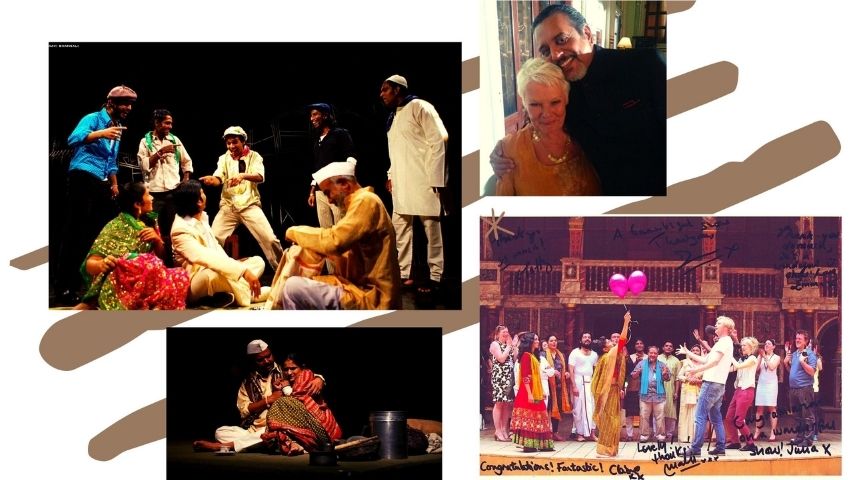
Have the COVID times, with all the set-backs, innovated theatre and performing arts as an online activity, giving it a new dimension? How do you see the immediate future for Indian theatre and the performing arts?
Actually, the COVID times were a huge setback to the performing arts, be it theatre or other forms of arts. To find a footing and revive the theatre was a huge problem. It was a task for theatre production companies to put up their plays online. Who will foot the expenses of doing theatre online? Will people actually watch these productions online? Some companies tried to innovate, but that module was just not feasible. I tried my best to keep this alive by doing workshops for adults as well as children and stressed the need to innovate for almost the entire period of the pandemic. It’s very sad that we as theatre practitioners could not really innovate and give it a new dimension or a new perspective.
To be very frank, it is still very difficult for theatre companies to come to terms with the two years that were lost due to the pandemic. Most have had to start from scratch. Not just theatre companies, but other forms of the performing arts too. People were not willing to go and watch anything in the theatre. The pandemic created a fear in the minds of the audiences. Since there were no audiences the theatre companies were also not willing to stage plays as it costs money. The theatre owners were not willing to bring down the rent, which meant a loss for the companies performing. I hope and wish that theatres do flourish and audiences come back to watch theatre, dance, musicals etc.
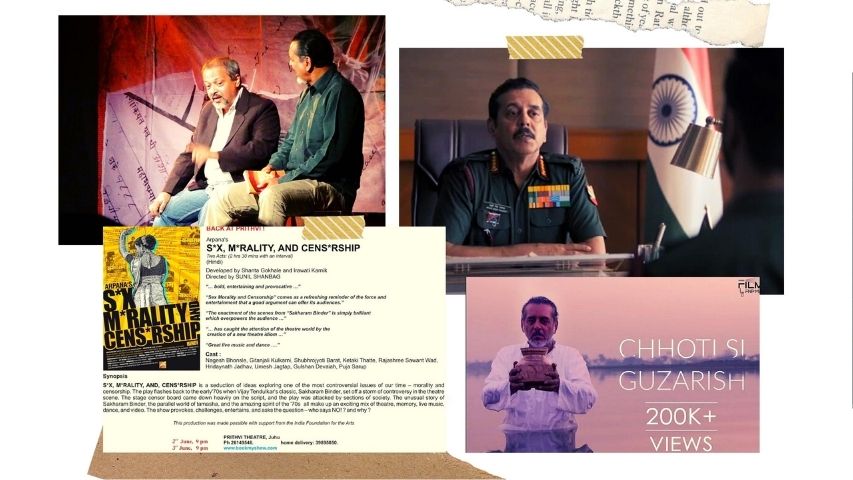
Now to revert to the beginning. Do inform a bit about your familial antecedents: parents, siblings. Your parents were very culturally inclined. They were part of IPTA. Were they oriented towards Left politics?
My mother and father were both inclined towards theatre from a very early stage in their lives. My mother Shashi Sharma worked with Satyadev Dubey in 1962 in a play called Tota Maina. I wasn’t aware of this until Dubey mentioned it to me when I started my journey in theatre with him in the year 1974-75 with a play called Sambhog Se Sanyas Tak.
My father, Mohan Sharma, as you rightly mentioned, was with Indian People’s Theatre Association (IPTA) as a treasurer for a pretty long time. He also acted in a few plays, but his work didn’t allow him to give too much time to theatre. My father was also a party member with leftist politics due to which he started his journey as a businessman with countries from the East European block. I think he wanted to establish himself as a businessman given the opportunities he got at that time. Once he got permission to do business with Czechoslovakia, it was easy for him to gain access to other East European countries. He was a self-made man.
My mother on the other hand was extremely passionate about acting. She worked with M.S Sathyu in his film Kahan Kahan Se Guzar Gaye, which I think was Anil Kapoor’s debut film. She did a lot of plays with our company Arpana. She worked in TV and commercials also. She did a small role in Aamir Khan’s film Talash. She just enjoyed every bit of her acting. My dad did act in a few plays of IPTA, best known by a play called Aakhri Shama, with Balraj Sahni. I must also mention here that dad and Balraj uncle started a theatre group called Juhu Arts Theatre under which they did plays before dad decided to pay more attention to his business. He was also instrumental in producing with NFDC (FFC) the film Garam Hava, which was M S Sathyu’s debut film and was also selected at the Cannes Film Festival way back in 1973. I have one sister Shilpi who is married and has a son Karan who is now coaching the Hongkong Tennis Association.
When did you first connect with plays? Sunil Shanbag (recipient of the Sangeet Natak Akademi Award for Theatre-Direction) and you have been family friends since childhood. Sunil had told me, "Mohan uncle would take Shishir and me to see IPTA plays in town. I remember seeing the classic Aakhri Shama numerous times. As we grew older, we would go on our own, and sometimes we’d get a ride back home with Balraj Sahni who lived in Juhu and dropped us on his way. Shishir and I were in awe of Balraj uncle, and we’d sit quietly in the back seat of his ambassador car, listening to post-show conversation between Balraj Sahni and whoever else was with him. I guess that was my first exposure to theatre.”
Sunil Shanbag and I have been family friends for the longest time. My mother used to take tuitions from Sunil’s mother even before my mother was married, or, after she was married. I have known Sunil from the day he was born. It’s been a great association with him and shall remain to be so.
My first connection with acting and plays happened way back in 1974 with Satyadev Dubey when he had written a play called Sambhog Se Sanyas Tak, which was staged in 1975 at the Rangmandir open air theatre in Bandra. It was truly an experience to remember. I had never ever acted before. Not even in school. And here I was thrown into the deep sea acting with none other than Naseeruddin Shah, Ratna Pathak, Neena Kulkarni and many others. I was nervous as hell to stand on that stage and speak those lines.
My dad used to take us to see plays in town, especially Tejpal. We saw Aakhri Shama several times. What can one say of Balraj uncle! He was such a fine actor. I was completely in awe of him. Yes, as Sunil says, I think my first exposure to theatre was when there were many IPTA parties at home and theatre was discussed.
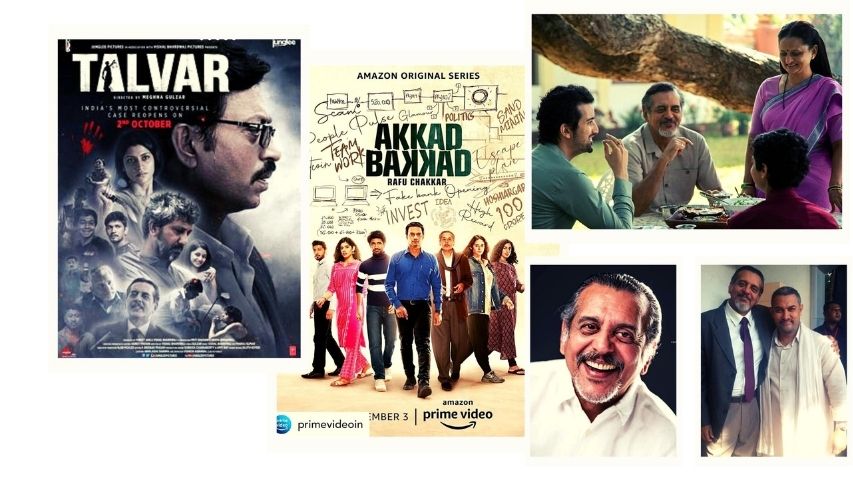
Do brief us on your school and college education.
My first school was Rose Manor in Santacruz where I was till senior KG. Then I joined Rishi Valley in the year 1962 in the 1st std when I was all of 6 years old. We were told that we have to travel by train with the other students and three teachers. It didn’t dawn on me till I reached school and night fell that I had no mummy. The first couple of years were quite difficult, but then one settled down in school. I didn’t complete my ISC from Rishi Valley. I came back to Mumbai in 1970 after 8 years in school and completed my ISC from Bombay Scottish. Once that was done, I joined Lala Lajpat Rai college in Haji Ali. I completed one year there and got a seat in NM college and did my B.Com with Business Management and joined my dad in his business.
Then marriage happened!
It was in 1978 that I got married to Lata. We have two beautiful daughters and four grand-children now. The daughters were extremely fortunate to marry their respective husbands and we are fortunate, too, to have such lovely sons-in-law.
Did theatre via Satyadev Dubey orient you to take it up as a serious vocation? How did Dubey enter your life and creatively mold it? Sunil Shanbag and you are from Dubey School of Drama (DSD).
Well to tell you frankly, I never thought I would take up theatre as a serious vocation, but somewhere I thought Sunil might. Sunil had done theatre in school too. Mine was just one of those things that stuck with me and I decided to take it up only after doing Sambhog Se Sanyas Tak.
We were having lunch at Ratna Pathak’s house in Dadar. Sunil, Ratna and me. Suddenly the door opens and there one sees this man Satyadev Dubey. I guess he knew Ratna because Dina Ben (Dina Pathak) was known to Dubey. He asked me if I was interested in acting and I said I don’t know the ABC of acting. The only words he said was ‘MAIN TUMHE ACTOR BANA KE HI CHHORUNGA.’ Those words still ring in my ears Appy!
Of course the first couple of years were terrible. The very thought of Dubey in front of you sent shivers down your spine. I was very bad then. But then Dubey being the person he is, instilled that confidence in me by giving me roles, which in turn would increase my confidence. My last play with him was Inshallah, which was written, acted and directed by him. Slowly but surely seeing actors like Naseer, Ratna, Neena, Sunil Shanbag, Akash Khurana on stage brought that confidence in me. I am and will always be indebted to Dubey and Sunil.
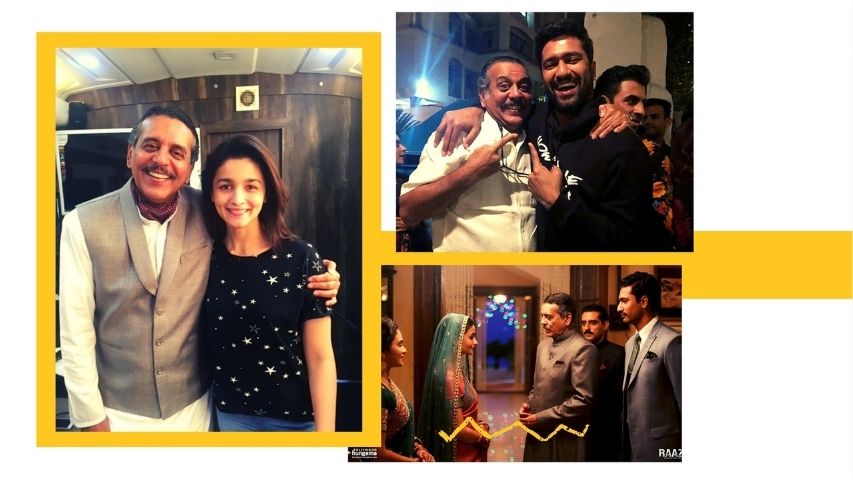
What about films? Do share a memory of a film or films that stayed with you in childhood/adolescence.
There is one film that will always stay with me and that is Garam Hava. Not because dad produced the film, but it was just a fantastic film. I had the opportunity of going to Cannes with Garam Hava and I was all of 18 years. Siddharth Kak used to write for a paper from Kolkata called Junior Statesman. He decided that I will be his cameraman, So, here I was with a broken camera on my way to Cannes as an official delegate. We stayed in Cannes for 10 days and then shifted to Paris where M S Sathyu would cook for us. It was probably my best ever memory during my adolescence.
In 1985 you formed your own theatre group, Theatre Arpana, along with Sunil Shanbag, Akash Khurana, Lata Sharma, Reetha Balsavar. The name was bestowed by Dubey himself. Sunil had told me, “One day Dubey called us aside and said our time with Theatre Unit was over and we needed to leave and make our own work. I guess he knew it was inevitable, but it was also very generous of him to cut us free. After the initial shock we were excited. We had enough theatre experience between us to start a new company and make plays. Shishir’s father, Mohan Sharma, gave us 10 thousand rupees to start us off, and Akash, Shishir, Utkarsh Mazumdar, Lata Sharma, Reetha Balsavar and I started Arpana. The first play Ooljulool, a translation of a Kannada play by Aadya Rangacharya, was deftly directed by Utkarsh Mazumdar. This was followed by Vijay Tendulkar’s popular romantic comedy Ashi Pakhre, directed in Hindi as Mat Yaad Dila, a delightful production by Akash Khurana. I began directing a couple of years later, and my first production for Arpana was a double bill of two short plays by the Polish playwright Slawomir Mrozek titled Striptease and Circus.” Do add to this.
1985 marked a new chapter in our lives as far as theatre is concerned. It was a difficult period for all of us. We were taken by surprise, but in retrospect I think that was the best thing that ever could happen to all of us. We started our own company Theatre Arpana, worked our way up the theatre ladder to create a niche for ourselves with plays directed by Utkarsh Mazumdar, Akash Khurana and then later Sunil. The play Ooljulool that Utkarsh directed was first staged at the Pragati Maidan in Delhi. Akash Khurana directed Mat Yaad Dila, after which we had a party at home and my dad gave us ten thousand to start with. Arpana was formally born.
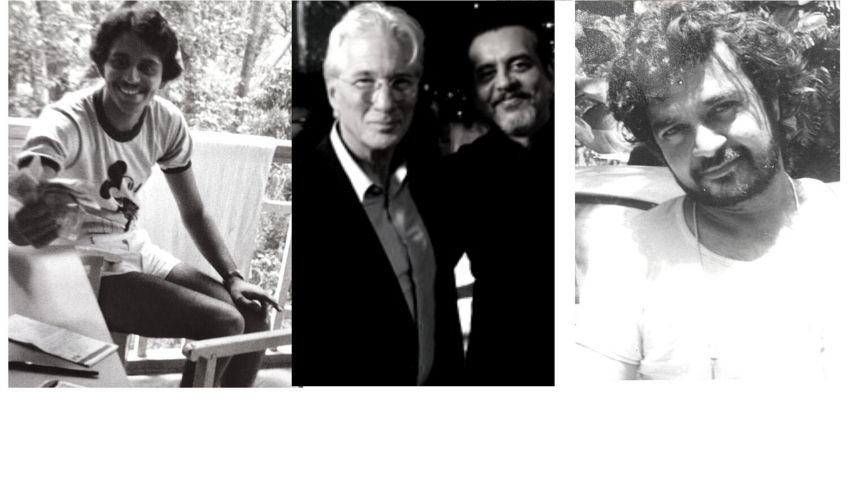
I have been fortunate to be an audience of Theatre Arpana and for the initial years an actor. Arpana has consolidated itself as a path-making theatre group. From its inception to today it has created its audience and enlarged its footprint nationally and also internationally. Do share the vision you started with.
You have acted in plays staged by Arpana, directed by Sunil Shanbag. When we started Arpana I personally don’t think there was any agenda, but as we went along, Sunil and Akash Khurana had a vision in mind to do plays, which are meaningful and contemporary. Hence Sunil started doing plays by Vijay Tendulkar, Mahesh Elkunchwar, Shanta Gokhale, then Mrozek’s plays.
Surely Sunil created that niche for Arpana. He had his audiences who came to see something meaningful, spend two hours at Prithvi watching good theatre and at the same time enjoying seeing some great performances on stage. We had decided that we shall perform in Prithvi only or auditoriums like Prithvi as the kind of theatre that was being done catered to spaces that were intimate. Arpana created that path making theatre for which it is known even today.
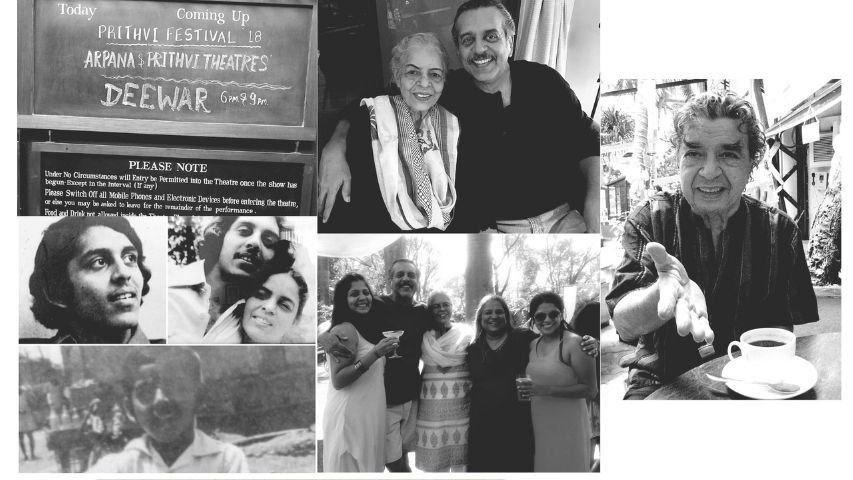
Theatre Arpana has presented plays that have been very innovative and original. Starting off with plays by Vijay Tendulkar, such as, ‘Mat Yaad Dila’ (directed by Akash Khurana), ‘Cyclewalla’ (directed by Sunil Shanbag) they did Avinash (written by Shanta Gokhale, directed by Sunil Shanbag). Their plays took them across India and onto the global stage. The plays mastered the idiom of incorporating literature, poetry, music, dance and the history of theatre itself.
A most impressive roll-call of plays include: Cotton 56 Polyester 84, Mastana Rampuri Chappan Churri, Sex, Morality and Censorship, Dreams of Talim, Walking to the Sun, Stories In A Song, Maro Piyu Gayo Rangoon, Club Desire, Loretta, Words Have Been Uttered, Deewar, Blank Page.
Maro Piyu Gayo Rangoon was a Gujarati production of William Shakespeare’s All’s Well That Ends Well. It got invited by the Shakespeare Globe Theater in London at the prestigious Globe International Festival in May 2012. In 2014 it was invited back to the Globe for another run of shows in a month that marked the 450th birth anniversary of Shakespeare. The Hindi version played as ‘Mere Piya Gaye Rangoon.’ Shanta Gokhale described the production as ‘a truly remarkable achievement.’ It has travelled to several European countries.
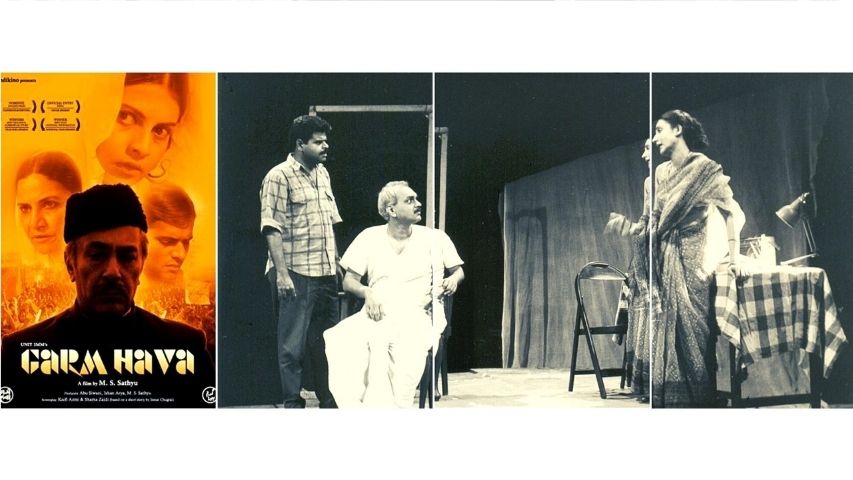
Shishir, as one of the closest insiders tell us of Theatre Arpana’s wonderful trajectory.
I think the 2000 period was by far the most impressive period that saw Arpana doing some great plays. You know Sunil very well and you also know the kind of plays he does. Stories in a Song is one such play that can be seen any number of times. There are people who have seen it more than 25 times. Shanta Gokhale’s Avinash is in my opinion one of Arpana’s best productions. Maro Piyu Gayo Rangoon was a remarkable play directed by Sunil. He chose to do this play in Gujarati.
Having been invited to The Globe in London was the high point any theatre company would like to experience. The year was 2014. We had the dates that we were to perform at The Globe. I was filming The Second-Best Exotic Marigold Hotel part 2 in Jaipur and Udaipur. I had the good fortune of being in the company of Dame Judi Dench, Maggie Smith, Richard Gere, Dev Patel and many others. I happened to have asked Judi if she was free during those dates that we were performing and she said yes. My next question was would she like to come for the play. To my utter surprise she said yes and booked six tickets for the play. She herself had done this play and was extremely excited to come and watch it.
I cannot tell you the excitement that there was within the group of having been invited by The Globe in London for the second time, which is extremely prestigious. It was a packed house with the audience standing and watching the play. There were sub-titles on the side pillars, which was only a formality. The buzz that Judi Dench was coming for the play had reached a peak. When I received Judi at the entrance it was a moment that I will never forget for the rest of my life. I requested Judi to come and have a glass of wine and chat with the cast after the play. She agreed. That I think was the icing on the cake. Judi spoke to the cast, spent a good hour backstage after the play. What a day it was for Arpana to come this far and perform at The Globe and that too in the 450th birth anniversary year of William Shakespeare.
This play was also done in Hindi as Mere Piya Gaye Rangoon. It was critically acclaimed not only by the audiences that came, but by the theatre stalwarts too.
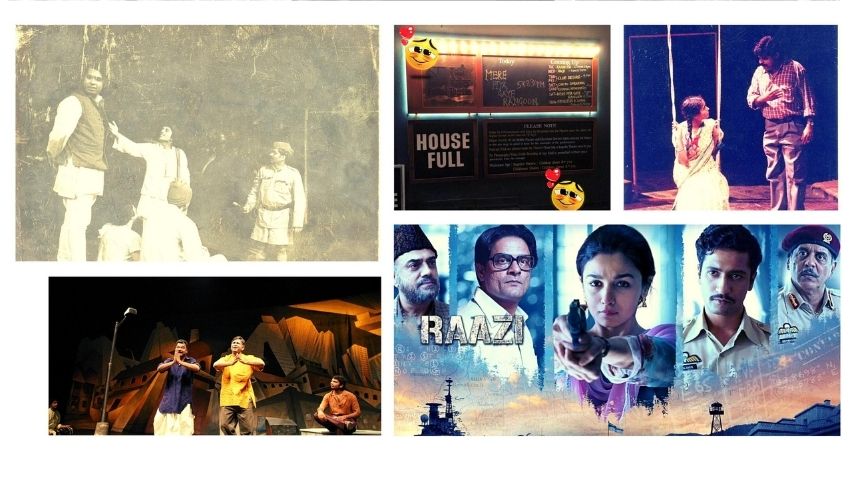
What are the plays in the offing?
To be frank with you, there is nothing in the offing due to many factors. Sunil is extremely busy with Tamasha theatre, which is his brain child and doing extremely well. The availability of dates from actors is probably the most difficult part of starting something new. All the actors have gotten very busy with the web opening out and plus good content films being made where good trained actors are needed.
Your acting work on television notably started with Swabhimaan (1995 - 1997), a daily soap on DD written by Shobha De, directed by Mahesh Bhatt and produced by Plus Channel. Do share its nostalgia.
Swabhimaan was my first TV show and I was very fortunate to be a part of a show that took the country by storm. Each episode was telecast twice in the day; once in the afternoon and then again at night. Vinod Ranganath who was co-writing the show with Shobha De, asked me during a play rehearsal in Chetna College if I would do a negative character in a show that he was writing. He also said that it is a 25-episode role. He asked me to go meet the concerned person in Film City. I reached there and to my surprise I saw Manoj Bajpayee. We both were asked to come and perform our scene in front of Mahesh Bhatt Sahab. That done, we were told that they will let us know by the night if we are chosen or not. Both of us were chosen and that started a journey on television.
I think I did more than 500 episodes. That journey was a very satisfying one. Worked with some names that are huge today: Ashutosh Rana, Manoj Bajpayee, Kumud Mishra, Rohit Roy, Harsh Chaya, Anju Mahendroo, Deepak Parashar. I was fortunate to have shared screen space with all these actors. It is very heartening to still be recognised as KD Saxena from Swabhimaan. We have kept in touch in spite of all of us being busy in our work schedules.
Your noteworthy satellite TV work since 1998 include Saaya, CID, Saturday Suspense, Aashirwaad, Waaris, Kanyadaan, Lipstick, Kumkum-Ek Pyaara Sa Bandhan, Ghar Ki Lakshmi Betiyann, Jaane Kya Baat Hui, Miley Jab Hum Tum, Yahaan Main Ghar Ghar Kheli. Do confirm and pick your favourites.
Yes, I guess you have picked out the best of my work. It’s extremely difficult to put a number to these shows. But if you really want to know my pick, I would say Saaya, Kanyadaan, Kumkum, Yahaan Main Ghar Ghar Kheli, a lot of the single episode shows in Saturday Suspense.
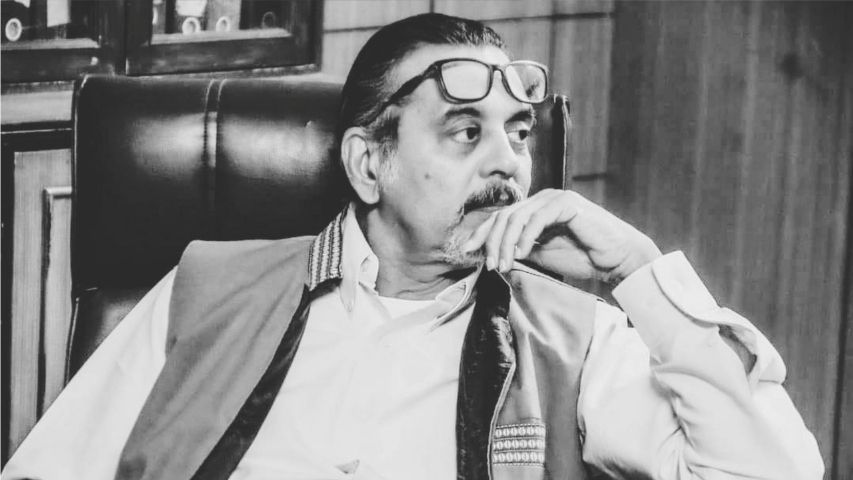
Your selected list of films are Chakravyuh (1996), Satya (1998), Bombay Boys (1998), Om Jai Jagdish (2002), Fanaa (2006), Sarkar Raj (2008), Kurbaan (2009), Mary Kom (2014), Tanu Weds Manu Returns (2015), Talvar (2015), Dangal (2016), Raazi (2018), Uri: The Surgical Strike (2019), Chhichhore (2019), Disco Raja (2020), Bombhaat (2020), The Big Bull (2021), Jersey (2022). Do share some nuggets and the most challenging parts you played. Your look lends itself to being aptly cast as an upright official, army personnel, coach, doctor, family-man.
As far as films are concerned, my favourites are Raazi, Talwar, Dangal, Chhichhore, Mary Kom, Om Jai Jagdish. In Sarkar Raj, sharing screen space with Bachchan Sahab was an experience to cherish. Uri was a great experience and working with Vicky Kaushal again after Raazi. But the icing on the cake was working with Paresh Rawal with whom I started my journey as an actor while we were in college. We did a play for the IPTA inter collegiate competition way back in 1973-74. And then worked with him in URI. It was surreal when we met in the director’s office. Felt so good and what an actor he is!
I also did a few Telugu films. Jersey was one such film that I am extremely proud of. Jersey was very challenging to do. One because of the language, which I had to get right. Raazi was another film that I enjoyed doing. I portrayed a Pakistani general. I looked up a lot of videos of the Pakistani army to try and figure out how to do justice to this character. Meghnaji was extremely helpful in the way we spoke Urdu. She was very particular with the nuances of the language.
Mary Kom, too, was a great learning experience. To understand the language of a boxer was very, very critical. We used to train in the boxing-ring to understand the body language of the boxer. We had to prepare the boxer for the bout plus encourage the boxer in the ring by using the exact words that were necessary for the boxer to understand. Talvar is a film that will remain my all-time favourite. Working with Meghna Gulzar was a treat in itself. Then I was very fortunate to share the screen with one of the finest actors, Irrfan Khan.
And then came your web-series.
Permanent Roommates was my first web show. Infact it was TVF that brought web to the country. We did two seasons and it was absolute fun doing that show. Bard of Blood is another show that I enjoyed. What the Folks was a thoroughly enjoyable show. City of dreams was a fabulous experience and working with Nagesh Kukunoor. Lately I did a very interesting show directed by Raj Kaushal called Akkad Bakkad Rafu Chakkar, which is streaming on Amazon Prime video. Cobalt Blue, a very interesting film, is streaming on Netflix. Choti Si Guzarish and Shinaakht are two short films, which I will always be proud of.
You are quoted saying “It’s hard to survive in the entertainment industry without a mix of passion and precision. The moment you start getting late at rehearsals, people will stop taking you seriously. Work passionately and be precise if you want to become something in life.”
I still maintain that survival in this industry without passion and precision is extremely hard. Discipline for an actor is by far the most important test. Commitment and focus follow. This industry is like an ocean. If you are thrown in the sea, you have to swim to the shore to survive. Work with a lot of sincerity, passion and I am sure you will find light at the end of the tunnel. Do not shirk your work under any circumstances. Your passion to fuel that commitment of being an actor is of utmost importance.
Shishir Sharma embodies passion, precision, and integrity in his being.




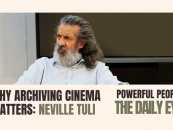
-173X130.jpg)
-173X130.jpg)
-173X130.jpg)
-173X130.jpg)
-173X130.jpg)

